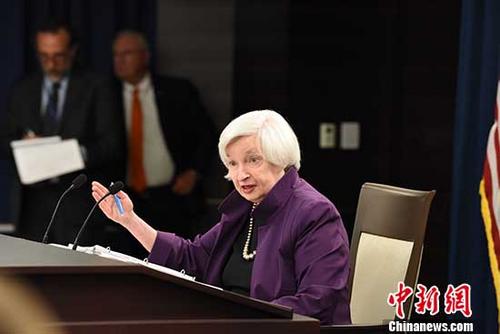BEIJING, Oct. 10 (Xinhua)-Singapore’s Lianhe Zaobao published an editorial on the 10th, saying that the term of office of the current Federal Reserve Chairman Yellen will expire in 2018, although there are still four months to go, and the battle for the chairmanship of the Federal Reserve has already started. US President Trump, who has been keeping his mouth shut about the next presidential candidate, finally revealed at the end of last month that he would give an answer in "the next two or three weeks". At present, the market is waiting for the next chairman, because it will have a far-reaching impact on the US capital market, monetary policy and economic trends.

The editorial said that Yellen has always been on Trump’s shortlist, and the possibility of re-appointment has not been ruled out. But Trump also frankly said that he had met with four candidates. Although it didn’t disclose who the four people were, according to White House officials’ talk and market speculation, they included Jerome Powell, the current Fed governor, Kevin Walsh, a former Morgan Stanley executive and former Fed governor, john tyler, a professor at Stanford University, and John allison, the former president of BB&T Company in the United States.
The Federal Reserve is an organization composed of member banks, independent of the US government and Congress, and responsible for the formulation and implementation of monetary policy, supervision of member banks and national payment systems. The chairman and members of the Federal Reserve are nominated by the President and appointed by the Senate to ensure their independence. The chairman candidate in Trump’s mind will have a certain impact on the market. Trump himself is also cautious about this appointment. He said that he had held four meetings on the issue of the new chairman.
In a speech last month, Yellen strongly defended the financial supervision measures after the financial crisis in 2008 and 2009. Although Yellen has expressed this view before, this speech has made the outside world think that the probability of her re-election has decreased, but some experts believe that the possibility of her re-election is still very high.
If Yellen is re-elected, the Fed’s monetary policy can continue to be implemented, including normalizing the currency, reducing the balance sheet and continuing to raise interest rates, that is, maintaining a clear policy path, and the market can also see the obvious guiding direction.
The Fed has raised interest rates three times in less than a year, and it is expected to raise interest rates again in December this year. As inflation is still below the target, there are still some dovish officials in the Fed who want to wait and see, but Rosengren, the hawkish chairman of the Boston Fed, said recently that the US labor market is already very tight, and it is imperative for the Fed to raise interest rates. Although Rosengren’s views often represent the overall policy direction of the Fed, whether to continue to raise interest rates in the future depends on who is the chairman of the Fed.
Kevin Walsh, 47, served as a director of the Federal Reserve from 2006 to 2011. He once called for the revision of the way the Fed formulates monetary policy, and publicly expressed his dissatisfaction with the current economic policy. He is more hawkish than Yellen in policy stance. He represents a possible direction for the Fed in the future. At present, every move of the Fed depends on data, but it doesn’t mean that the Fed’s policy is no longer important. Under Trump’s "US priority" policy, whether the Fed will lose its independence has always been a concern.
The article said that the current economic growth in the United States is stable, and there will be no risk of soaring inflation. Trump’s economic policy is becoming more and more obvious. Who will be the next chairman of the Federal Reserve may have an impact on the sustainability of US economic growth. A stable monetary policy is also expected by the market, and the established policy of raising interest rates must continue, so that the United States can steadily embark on the track of monetary policy normalization.
The article pointed out that at the end of last year, the Federal Reserve Open Market Committee unanimously agreed to raise interest rates in an unprecedented way, and many central banks followed suit. Although it has a short-term impact on the stock market and foreign exchange market, the world must bid farewell to the era of ultra-low interest rates in order to get rid of the risk of asset bubble expansion. Whether the Fed’s operational policy will continue to be stable after five months still depends on the next personnel transfer of the chairman and other directors.